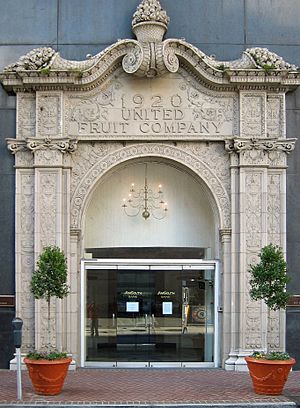United Fruit Company facts for kids
The United Fruit Company was a big American company. It focused on tropical fruits, especially bananas. These fruits were grown on large farms in Central and South America. Then, they were sold in the United States and Europe. The company started in 1899. It was formed when two banana businesses, one owned by Minor C. Keith and the other by Andrew W. Preston (the Boston Fruit Company), joined together.
The company grew a lot in the early and mid-1900s. It controlled huge areas of land and many ways to transport goods. This included parts of Central America, the Caribbean coast of Colombia, Ecuador, and the West Indies. It was a major competitor to the Standard Fruit Company in selling bananas worldwide.
The United Fruit Company became very powerful in some areas. It had a monopoly, meaning it was the only big company selling bananas there. These places were sometimes called banana republics. This term described countries where a foreign company had a lot of control over the government and economy.
The company had a big and lasting effect on many Latin American countries. Some people said it practiced neocolonialism. This means a powerful country or company controls a weaker country's economy and politics, even without directly ruling it. The United Fruit Company was often seen as an example of how a large company can influence a country's internal affairs.
After facing some money problems, United Fruit joined with another company in 1970. It became the United Brands Company. Later, in 1984, the company changed again. It is now known as Chiquita Brands International.
Contents
How the Company Started
The United Fruit Company began in 1899. It was a merger of two important banana businesses. One was owned by Minor C. Keith, who had built railroads in Central America. He also started growing bananas along his railway lines. The other was the Boston Fruit Company, led by Andrew W. Preston. This company brought bananas from the Caribbean to the United States. By combining, they created a much larger and more powerful company.
Impact on Countries
The United Fruit Company had a huge impact on the countries where it operated. It owned vast amounts of land. It also built railroads, ports, and communication systems. These were needed to grow and ship bananas. This made the company very important to the economies of these nations.
Political Influence
Because of its economic power, the company often had a lot of influence on local governments. Critics said the company sometimes interfered in the politics of these countries. They wanted to protect their business interests. This led to the idea of "banana republics." These were countries where a foreign company had a lot of say in how the country was run.
For example, in 1954, the government of Guatemala tried to take some unused land from the company. They wanted to give it to poor farmers. The United States government, influenced by the company, helped to overthrow the Guatemalan president. This event is known as the 1954 Guatemalan coup d'état. It shows how powerful the company was.
Company Changes Over Time
The United Fruit Company was very successful for many years. But by the late 1960s, it started to face financial difficulties. In 1970, it merged with AMK, a company owned by Eli M. Black. The new company was named the United Brands Company.
Later, in 1984, Carl Lindner, Jr. took over United Brands. He changed its name to Chiquita Brands International. Today, Chiquita is still a well-known brand for bananas and other fruits.
Images for kids
-
When President Jacobo Árbenz Guzmán attempted a redistribution of land, he was overthrown in the 1954 Guatemalan coup d'état
See also
 In Spanish: United Fruit Company para niños
In Spanish: United Fruit Company para niños
 | Stephanie Wilson |
 | Charles Bolden |
 | Ronald McNair |
 | Frederick D. Gregory |










